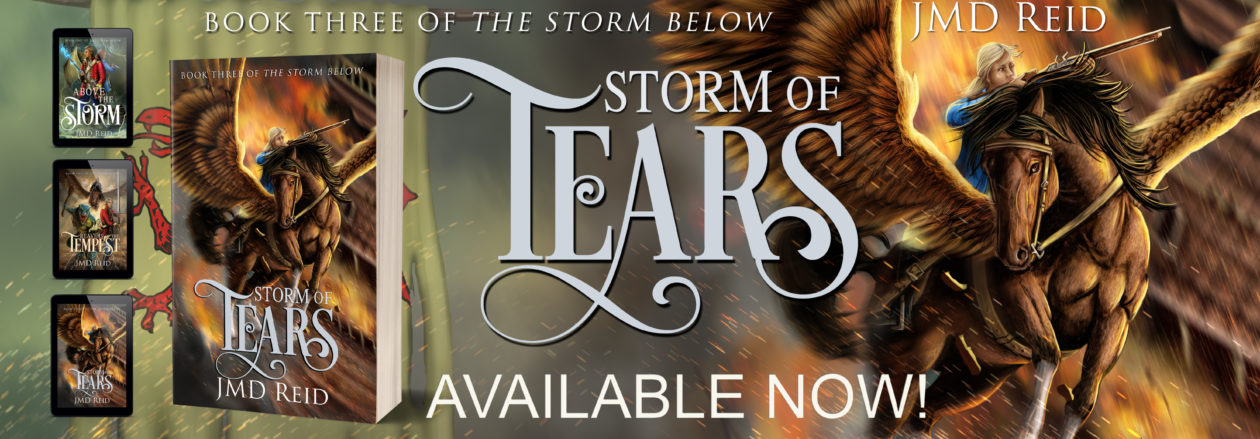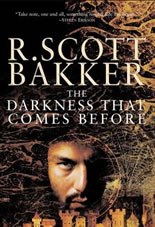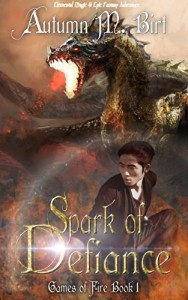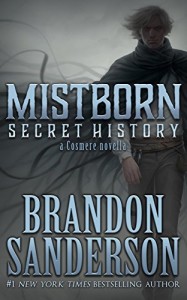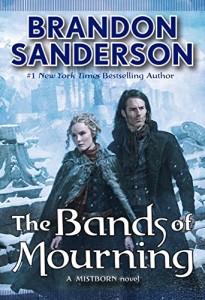Reread of Prince of Nothing Trilogy
Book 1: The Darkness that Comes Before
by R. Scott Bakker
Part 1
The Sorcerer
Chapter 1
Carythusal
Welcome to Chapter One of my reread. Click here if you missed the Prologue!
There are three, and only three, kinds of men in the world: cynics, fanatics and Mandate Schoolmen.
—Ontillas, On the Folly of Men
The author has often observed that in the genesis of great events, men generally posses no inkling of what their actions portend. This problem is not, as one might suppose, a result of men’s blindness to the consequences of their actions. Rather it is a result of the mad way the dreadful turns on the trivial when the ends of one man cross the ends of another. The Schoolmen of the Scarlet Spires have an old saying: “When one man chases a hare, he finds a hare. But when many men chase a hare, they find a dragon.” In the prosecution of competing human interests, the result is always unknown, and all too often terrifying.
—Drusas Achamian, Compendium of the First Holy War
Thoughts
Cynicism and fanaticism are opposite sides of the coin of belief. Mandate Schoolmen straddle both sides. Fanatical in their belief of the consult. Because the greater Three Seas ridicule them and their mission, cynicism has set in. Like the old saying that every cynic is a disillusion romantic.
History is full of examples of the consequences of actions. The assassination of Duke Ferdinand set off WWI. The Serbian separatist that assassinated him just wanted independence from Austria. WWI ended the German Empire (the Second Reich), caused the downfall of the Romanovs, and the rise of the Soviet Union. I absolutely love the quote from the Scarlet Spire (who were about to meet in the story). Humans by themselves can be rational and intelligent, but in groups we feed upon each other, echoing each others thoughts. Groupthink can be a dangerous beast.
Midwinter, 4110 Year-of-the-Tusk, Carythusal
We are introduced to Drusas Achamian: Mandate Schoolman (sorcerer) and spy. He is in the city of Carythusal, capital of High Ainon, and home of the rival sorcerer school, the Scarlet Spires. In a tavern in Carythusal, he is slowly recruiting Geshruuni, Captain of the Javreh. The Javreh are the warrior-slaves of the Scarlet Spire. Out of the blue, Geshruuni states he knows Achamian is a spy.
Achamian tries to bluff Geshruuni but his momentary hesitation when he is called a Schoolman betrays him. Geshruuni speculates on what School had sent Achamian. The Imperial Saik, the Mysunai, or the Mandate. Geshruuni wagers of Achamian of being a Mandate. Achamian, now terrified of being caught by the Scarlet Spire, prepares to unleash his sorcery, not caring of the consequences. Geshruuni reaches into his tunic and Achamian realizes it is too late to use sorcery. Geshruuni produces his Chorae. All sorcerer’s could feel a Chorae’s unnatural presence, and Achamian had used Geshruuni’s to identify him as the Javreh Captain.
Chorae. Schoolmen called them Trinkets. Small names are often given to horrifying things. But for other men, those who followed the Thousand Temples in condemning sorcery as blasphemy, they were called Tears of God. But the God had no hand in their manufacture. Chorae were relics of the Ancient North, so valuable that only the marriage of heirs, murder, or the tribute of entire nations could purchase them. They were worth the price: Chorae rendered their bearers immune to sorcery and killed any sorcerer unfortunate enough to touch them.
Geshruuni grabs Achamian’s hand and holds the Chorae over it. Geshruuni calls the Scarlet Spires as ruthless and cruel to their enemies and servants alike. Achamian asks what Geshruuni wants and he answers “What all men want, Akka. Truth.”
Death poised between the callused fingers of a slave. But Achamian was a Schoolman, and for Schoolmen nothing, not even life itself, was as precious as the Truth. They were its miserly keepers, and they warred for its possession across all the shadowy grottoes of the three Seas. Better to die than to yield Mandate truth to the Scarlet Spires.
Achamian sees no Schoolmen in the crowd. Sorcerers can see other sorcerer’s by the bruise of their crimes against reality. Realizing Geshruuni is playing his own game, Achamian confesses to being a spy for the Mandate School. Geshruuni releases Achamian and agrees to spy for the Mandate against his masters.
Achamian muses on being a spy. As the son of a poor Nroni fisherman he never even knew the word spy. As a youth he was identified as one of the Few (a sorcerer) and taken to Atyersus by the Mandate School for training. Chosen as one of their spies, Achamian has crisscrossed the Three Seas and seen many things. Far away places were no longer exotic to Achamian. Nobles, Emperor and Kings seemed as base as lesser men. He had educated princes, insulted grandmasters, and infuriated Shrial priests. Now in his middle years, Achamian has grown weary of being a spy and sorcerer.
Achamian is perplex and dismayed by his meeting with Geshruuni instead of feeling elated at recruiting such a well-placed spy. Geshruuni, motivated by vengeance, told him potent secrets of the Scarlet Spires. Geshruuni penetrated Achamian’s disguise because he was to free with his money, unlike the merchant Achamian pretended to be.
Achamian is alarmed to find out the Scarlet Spire has been at war. The schools skirmished with spies, assassinations, and diplomacy all the time. However, this war was different. Ten years ago, Grandmaster Sasheoka was assassinated in the inner sanctums of the Scarlet Spire. Despite possessing the Abstraction of the Gnosis, the most powerful school of sorcery, the Mandate School could not have succeed at the task. Geshruuni reveals the Cishaurim, the heathen school of the Fanim, were responsible.
There was a saying common to the Three Seas: “Only the Few can see the Few.” Sorcery was violent. To speak it was tot cut the world as surely as if with a knife. But only the Few—sorcerers–could see this mutilation, and only they could see, moreover, the blood on the hands of the mutilator-the “mark,” as it was called.
Not so with the Cishaurim. No one knew why or how, but they worked events as grand and as devastating as any sorcery without marking the world or bearing the mark of their crimes.
Unable to see the Cishaurim as one of the few, they would easily be able to enter the Scarlet Spire. Now hounds trained to smell the dye of Cishaurim robes patrol the halls. Achamian is confused what would possess the Cishaurim to declare war on the largest, most powerful School. Geshruuni can only shrug. No one knows.
Geshruuni questions his decision to betray the Scarlet Spire as we walks home. He finds gossiping like a woman did not satisfy his desire for revenge. He laments his status as a slave and wishes he could be a conqueror. Despite being drunk, Geshruuni realizes he is being followed and beings plotting “scenario after bloody scenario” for the presumed thief.
Geshruuni ambushes his stalker, and is surprised to see a fat man from the tavern and not a footpad. Thinking it is a Scarlet Spire Schoolman, Geshruuni throws his Chorae to kill the man. The man catches the Chorae and doesn’t die. The fat man reveals he was following Achamian and berates Geshruuni, repeatedly calling him slave and ordering him to heel like a dog. Geshruuni grabs the man and pulls a knife, threatening to kill him. The next thing Geshruuni knows is pain in his arm and he drops the knife. Geshruuni goes for his sword and the fat man slaps him hard. The fat man continues slapping and berating Geshruuni, his voice sounding more and more inhuman. Finally, Geshruuni is struck so hard he falls to his knees.
“What are you?” Geshruuni cried through bloodied lips.
As the shadow of the of the fat man encompassed him, Geshruuni watched his round face loosen, then flex as tight as a beggar’s hand about copper. Sorcery. But how could it be? He holds a Chorae—
“Something impossibly ancient,” the abomination said softly. “Inconceivably beautiful.”
After meeting with Geshruuni, Achamian returned to the hovel he stayed at, went to bed and dreamed. Every night, Mandate Schoolmen dream scenes from the life of Seswatha. Seswatha fought the No-God during the Apocalypse and founded that last Gnostic School, the Mandate. In the dream, part of Achamian knows he witnesses events 2000 yeas old, but part of him was Seswatha. The Mandate call this particular dream the Death and Prophecy of Anasûrimbor Celmomas.
Anasûrimbor Celmomas, the last High King of Kûniüri, has fallen before a Sranc chieftain. Seswatha kills the Sranc with sorcery and goes to the dying king’s side. In the distant, a dragon flies over the field of battle. Seswatha knows Kûniüri has fallen. With the help of a Trysë knight, they drag the dying king from the battlefield.
Seswatha pleads with Celmomas not to die. Seswatha believes without the High King, the world will end and the No-God will win. As Celmomas dies he has a vision. The gods have not abandoned men to the No-God, his darkness is not all encompassing. The burden to defeat him falls to Seswatha.
Celmomas asks Seswatha to forgiven him for being a stubborn fool. For being unjust to Seswatha. Seswatha forgives him. Celmomas asks if he’ll see his dead son in the afterlife. “As his father, and as his king.” Seswatha answers. With pride, Celmomas talks about the time his son stole into the deepest pits of Golgotterath. Celmomas’s vision continues, and he sees his son riding through the sky. Celmomas’s son speaks to him.
“He says … says such sweet things to give me comfort. He says that one of my seed will return, Seswatha—an Anasûrimbor will return …” A shudder wracked the old man, forcing breath and spittle through his teeth.
“At the end of the world.”
The bright eyes of Anasûrimbor Celmomas II, White Lord of Trysë, High King of Kûniüri, went blank. And with them, the evening sun faltered, plunging the bronze-armored glory of the Norsirai into twilight.
Achamian awakens and weeps for a long dead king. In the distant he can hear a dog or a man howling.
Geshruuni has been tortured by the abomination. He told the abomination everything and now the thing drags him towards the river. He panics. Geshruuni asks why, he told the abomination everything. The abomination answers: “the Mandate have many eyes and we have much plucking to do.” The abomination throws Geshruuni into the river where he drowns.
The next morning, when Achamian awakes, he writes in his dream journal about the latest Seswatha dream. He dreamed of the Ford of Tywanrae (the same), the Burning of the Library of Sauglish (different, he saw his face not Seswatha’s in a mirror), and the Prophecy of Celmomas. At first he rights same, but scratches it out and writes, “Different. More powerful.”
Achamian questions his own fixation on recording the dreams. Men have been driving mad trying to decode the permutations of Seswatha’s dreams. For a moment, Achamian has a panic attack of still being on the battlefield. Despite the defeat of the No-God, Seswatha knew the conflict wasn’t over. The Sclyvendi and the Sranc still existed. Golgotterath remained and the Consult, servants of the No-God, still ruled there. So that the memory of the Apocalypse would never fade, Seswatha’s followers would get to relive it.
Achamian next uses the Cants of Calling to communicate with Atyersus, the citadel of the Mandate. His handlers are disinterested in the secret war and instead summon Achamian home. Achamian is surprised and ask why. They answer it involves the Thousand Temples. Cynically, Achamian thinks of one more meaningless mission as he packs up his belongings.
Unlike the other Great Factions of the Three Seas, who vied for tangible ends, the Mandate warred against the Consult. But for 300 years, no sign of the Consult had been found ,and the Mandate waged a war without a foe. This has made the Mandate the laughingstock of the Three Seas. Now the Mandate was adrift without purpose, filling the time with pointless actions like spying of the Scarlet Spire. Achamian is hopeful that this sudden mission to the Thousand Temples will have real purpose.
My Thoughts
Achamian is an unusual protagonist in the genre of fantasy. Middle-aged and burned out at his job. He is world weary instead of the fresh-eyed youth (which Kellhus in the prologue almost is until you realize he is a man without emotions). We meet Achamian just as he underestimates the intelligence of Geshruuni. This is not the first dangerous situation Achamian has been in and it shows. While he panics internally, externally he continues his ruse as a merchant out drinking. We even see Achamian resolve when he thinks faces death or betrayal of his order and he chooses death.
When Geshruuni instead spares Achamian, Bakker compares being a spy to being a whore. Bakker uses this analogy a lot with Achamian. To be successful both must play a role. They have to adapt quickly, putting on the right performance to manipulate. Both must be good judges of character. Grave misjudgment can end badly for both the spy and the prostitute, particularly when no legal or social conventions protect them.
Achamian is unnerved by his underestimation of Geshruuni. By no skill of his own, Achamian uncovered powerful knowledge. But had Geshruuni been loyal to his masters, Achamian would be facing torture and death. Achamian has questions and worries about both his ability and his mission that will continue to haunt him going forward.
And poor Geshruuni. The abomination strips Geshruuni of his bravado with a few slaps. And for nothing. The Mandate aren’t really interested in his grand secret. They care so little, they have summoned Achamian away for a more important mission.
I’ll have more to say on the abominations when we learn more about them. Clearly, they are enemies of the Mandate. But if the Consult hasn’t been active for 300 years, maybe its because they were working on new, devious plans to continue their ancient war.
The Seswatha dreams are some of my favorite parts of the series. I love the glimpse Bakker gives us of the Apocalypse, showing us the consequences if the Mandate’s war against the Consult is lost. It wouldn’t be epic fantasy without apocalyptic prophecies. After Achamian awakens, he fanatically writes in his dream diary while cynically questioning the purpose in deciphering those dreams. He walks that line of fanaticism to follow and understand Seswatha’s life and the cynicism brought along by years of pointless, frivolous busy work.
Bakker drops such interesting tidbits about his world, seeding both the backstory and the past. At once he sets up the political maneuvering that will dominate the rest of the book and explains how his sorcery works, the differences between the schools, and why the Fanim Cishaurim are so feared by other sorcerers. He is building the foundation that the entire Prince of Nothing Series rests upon. Why did the Cishaurim assassinate Sasheoka? What are the Consult up to? Who are the abominations? And what is so important about the Thousand Temple?
The prophecy is very interesting. An Anasûrimbor shall return. But which one? We know Moënghus went ahead of Kellhus. He lurks somewhere in the three seas. Is he the one prophecy speaks of, or is Kellhus who is even know making his way across the sranc-infested wilderness.
